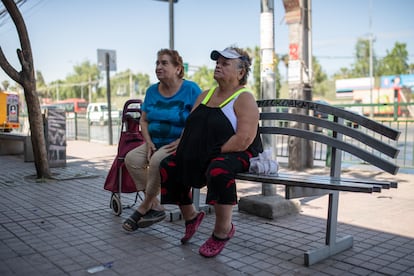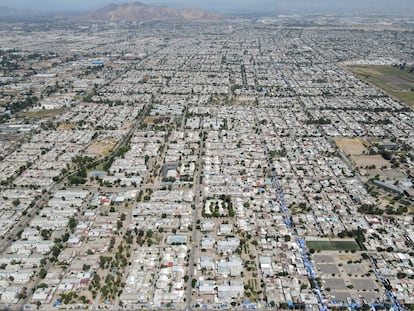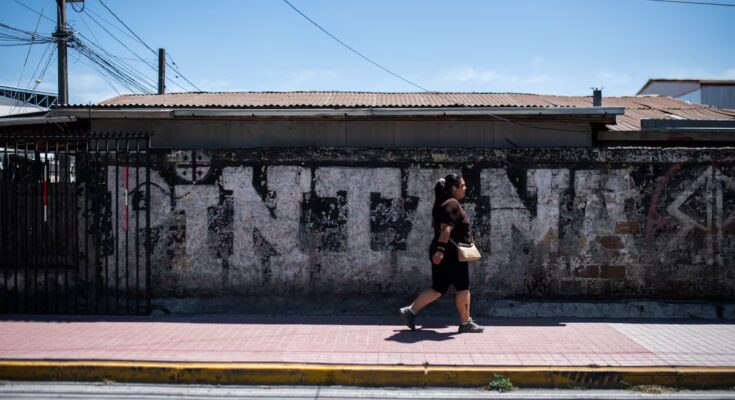If Chile’s first presidential round had been decided in one of Santiago’s most humble municipalities, La Pintana, left-wing candidate Jeannette Jara and economist Franco Parisi, leader of the People’s Party (PDG), would have competed for the presidency. In that municipality, with almost 190 thousand inhabitants, Parisi obtained 26.77%, about seven points more than the ultra-conservative José Antonio Kast. He was only surpassed by Jara, who got 30.9%.
But La Pintana is not Chile, but just an area where Parisi enjoys great popularity. With an anti-system speech, this 58-year-old economist surprised in the elections of November 16, when he obtained 19.7% of the votes throughout the country, placing himself in third place without being preceded by the main polls in the country which gave that position to the former mayor Evelyn Matthei, of the traditional right, or to the libertarian Johannes Kaiser, considered more radical than Kast. There were regions where Parisi even surpassed Jara and Kast in votes, such as Arica and Parinacota (27.8%), Tarapacá (31.1%), Antofagasta (34.9%) and Atacama (32.6%). Now his voters are fundamental to the outcome of the ballot and the 14 parliamentarians that his party won in the Chamber of Deputies will be fundamental for the next Government.
The result of last Sunday’s elections was surprising not only for the pollsters, but also for Óscar Hernández, a 43-year-old taxi driver, resident of La Pintana, but for reasons different from those of the pollsters. He hoped to see Parisi in the run-off on 14 December: “We have become tired of the same old politicians, the people are fed up with false promises, starting with the Boric government which promised things that were never kept. Parisi does not belong to an elite like Jara or Kast, right or left; he tells things as they are and the people like this, who are angry (irritated) in Chile”.
Hernández was at the closing of the then presidential candidate’s campaign on November 12. An act that, in fact, was carried out in Pablo de Rokha park La Pintana, surrounded by hundreds of people, with cars tuning – the former Moneda candidate is a fan of this discipline, which consists of urban races on modified vehicles – and of listening to music. This is also how Felipe Olade, a 37-year-old mechanic, remembers that when he listens to Parisi, for whom he voted, «his ideas make sense to him because they connect with what I think». Like the leader of the PDG, whom he has admired since he saw him on the program streaming Bad Boys defines themselves as neither left nor right, they only believe that “politicians hurt us poor people because they don’t let us stand out, they always want us at the bottom and they want us at the top”.
La Pintana, a municipality officially created in 1984, has an area of approximately 30 square kilometers in which a large part are vulnerable neighborhoods – better known as cities in Chile – where social housing is concentrated, some built in concrete and others in wood. There is garbage in some corners, a few supermarkets and many small grocery stores. Santiago’s metro stations are far away (an hour’s walk), many people travel on cargo motorcycles – popularly called toritos – and micro-drug trafficking is a major problem.
Very close to the Plaza de Armas of this municipality are sitting María Eugenia Contreras, a pensioner, together with a neighbor from the sector called “Magdalena Dos”, who agree that they are in a relegated municipality.

It’s an almost universal feeling for its inhabitants. This is also confirmed by Juan Carlos Espinosa, 58, who lives in Villa Gabriela Mistral: “This is a municipality marginalized by governments. It is little considered. If someone says that one comes from La Pintana and tells it to others, he is immediately despised. It is where perhaps there are more crimes and where drugs are around the corner. They only remember us to look for votes, but when they are in government we do not exist. For this reason, “I am apolitical, I did not vote on Sunday, I don’t know if I they will call to give me a fine and if so I don’t have the money to pay.”
He became unemployed after being hit by a car a few years ago, leaving him with a hip injury that prevented him from continuing in the construction industry. Occasionally, to feed her six-year-old granddaughter, she asked a neighbor for money, she says.

Parisi did not give his support to any of the candidates who went to the ballot, but asked them to “earn their votes”. And this Monday, in a new phase of the presidential race, Jara had a meeting with the inhabitants of La Pintana, the same thing that Gabriel Boric, a leftist, did in the final phase of his campaign launched four years ago, when he made a comparison with Kast.
In that municipality Boric had won not only the presidential elections of 19 December 2021, but also those of 21 November when he won with almost a third of the votes, while the Parisi option came in fifth place. “Chile has become more insecure, neither Las Condes nor La Pintana are safe from this, it affects us all equally and this is something that has gotten worse in this government,” says Ricardo Garrido, a 77-year-old pensioner, who works in the mechanical workshop of one of his sons.



